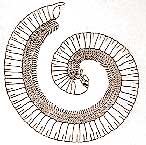How to Control Millepede Pests using Organic methods
ORGANIC CONTROL OF MILLIPEDES
 Millipedes can be a pest in the garden as they eat all kinds of potatoes, flower
bulbs and tubers.
Millipedes can be a pest in the garden as they eat all kinds of potatoes, flower
bulbs and tubers.
A millipede is not poisonous but it can emit an irritating fluid that can cause an allergic reaction in some people.
Millipedes live in the garden in areas of moist mulch, compost and lawn thatch.
They lay between 50 to 100 eggs a year and live for about three years.
Millipedes can be distinguished from centipedes as they have have two legs to each body segment - centipedes have only one leg to a segment.
BLACK MILLIPEDE (Tachypodiulus Niger)
The Black Millipede (Tachypodiulus niger), looks like a length of black, armoured pipe and coils stiffly like a watch spring.
SPOTTED MILLIPEDE (Blaniulus guttulatus)
The Spotted Millipede (Blaniulus guttulatus), has a row of reddish spots along each side of its yellow body.
CONTROLLING MILLIPEDES ORGANICALLY IN THE GARDEN
There are a few methods that can be tried to contol millipede pests in the garden organically without the use of pesticides:
Reduce moist areas in the garden where millipede eggs overwinter .
Rake out old mulch under plants replace it with fresh mulch or straw.
Move piles of leaves to a compost area away from areas that you want to keep free of millipedes.
Keep your lawn mown often so that any thatch that is there doesn’t become wet and sodden
Use millipede traps.
MILLIPEDE TRAPS
Millipede traps can be made from expanded metal of the smallest size mesh and painted with black bitumen paint to prevent them rusting.
Cut the mesh into oblongs 200mm (8”) long and 125mm (5”) wide, and bend these round a hoe handle.
Flatten one end of each, so that this and the side can be laced together with thin galvanised iron wire, which makes a handle looped above the open end.
Fill the millipede traps with potato peelings and bury them, handle up, near whatever is being attacked in your garden.
Once a week pull the millipede traps out by the handle and put the contents into boiling water to kill the millipedes, or, if you keep chickens, in the chicken run where they will be eagerly eaten.
OTHER USEFUL ARTICLES ON GARDEN GROWER
Millipedes - organic methods of controlling millipede pests in the garden, facts about how to control millipedes.